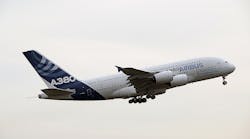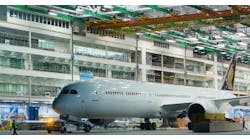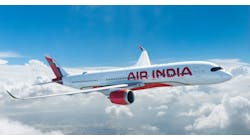Airbus reported a successful first flight for an A380 aircraft operating on 100% Sustainable Aviation Fuel (SAF) last week. The three-hour flight was conducted from Toulouse, France, with one Rolls-Royce Trent 900 engine operating on 100% SAF – a jet fuel produced from waste oils derived from biological sources (e.g., cooking oil, other non-palm waste oils from plants, agricultural residue, or non-fossil CO2), or solid waste from homes or businesses (e.g., packaging, paper, textiles, food waste.)
A second test of 100% SAF for takeoff and landing is scheduled with the same aircraft later this week.
The A380 is a four-engine, wide-body jet and the world’s largest commercial aircraft – capable of carrying up to 850 passengers in an all-economy-class arrangement, making it the world’s largest passenger jet. Some models are adapted for cargo service.
Currently, commercial aircraft are certified to operate on a maximum of 50% SAF blended with conventional jet fuel, though aircraft and jet-engine manufacturers have made commitments to increase the effective applicability of the alternative fuel.
Numerous other 100% SAF tests are underway by Boeing, Embraer, GE Aviation, Pratt & Whitney, and Rolls-Royce to establish the capabilities and needs of current technologies to reduce carbon emissions in commercial aviation.
The A380 now is the third Airbus type to fly on 100% SAF, following an A3350 flight last March and an A319neo flight in October 2021.
All Airbus aircraft are currently certified to fly with up to a 50% blend of SAF mixed with kerosene, and the OEM aims to achieve certification for 100% SAF by the end of this decade.






